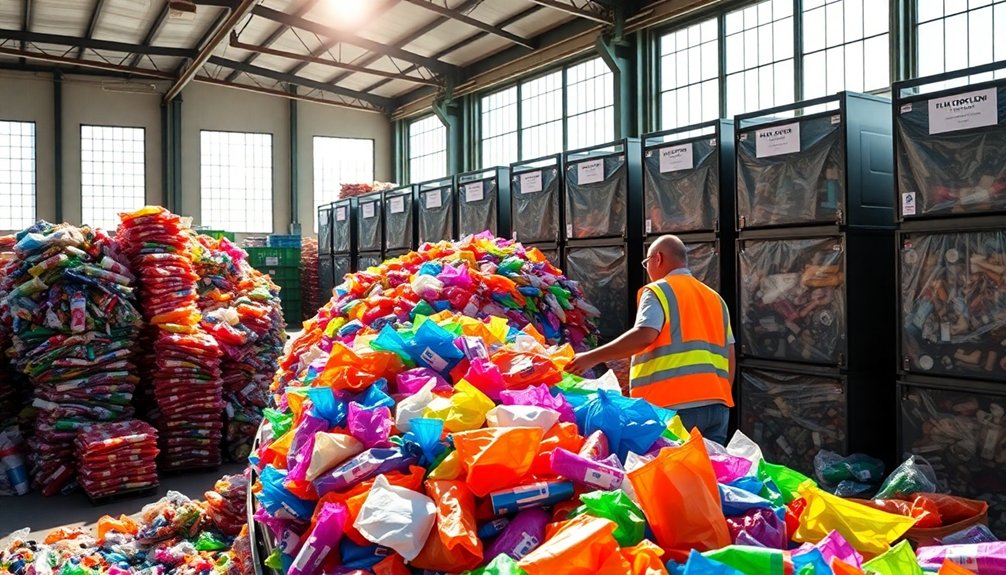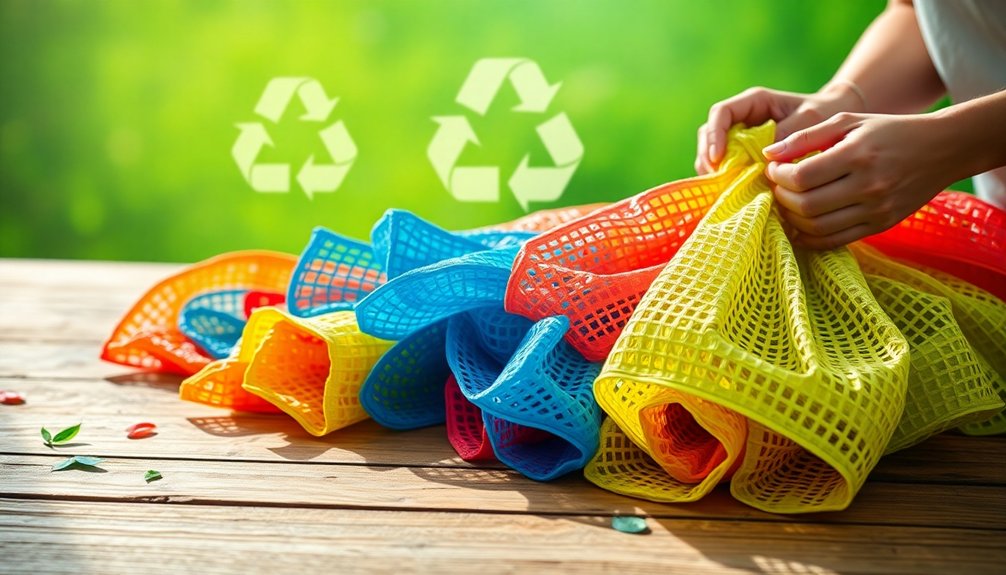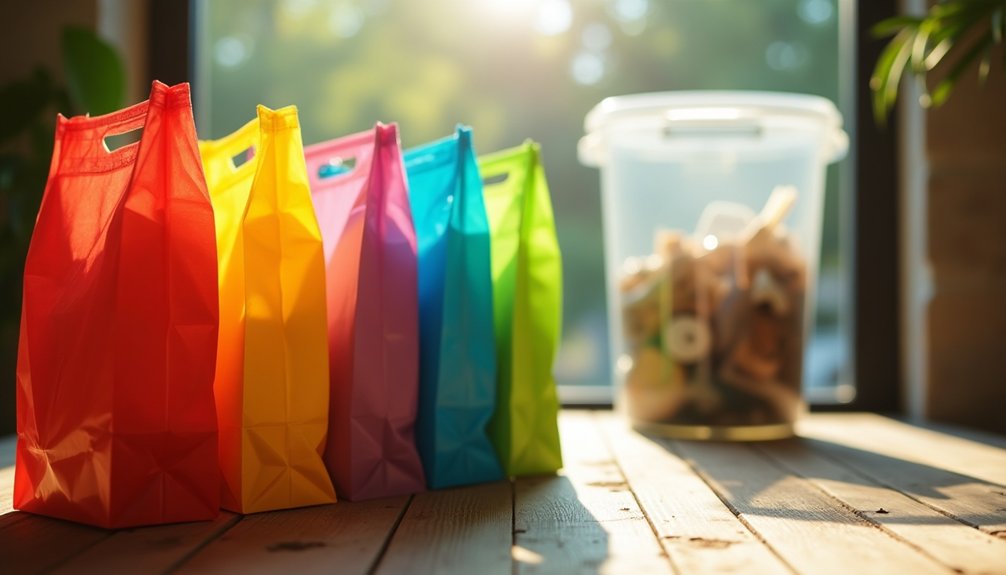Yes, polypropylene bags are recyclable, but it's important to know how to dispose of them correctly. Most curbside recycling programs don't accept these bags, so you'll need to find a designated drop-off center. Make sure the bags are clean and dry to prevent contamination. Resources like Earth911 can help you locate nearby facilities that accept polypropylene. By recycling these bags, you can contribute to energy conservation and reduce waste in landfills. If you want to discover more options and tips for proper disposal, keep exploring the various resources available.
Key Takeaways
- Polypropylene bags, marked with recycling code #5, are not typically accepted in curbside recycling programs.
- Designated drop-off centers are available for recycling polypropylene bags; they must be clean and dry.
- Recycling polypropylene uses 88% less energy than producing new bags, significantly reducing environmental impact.
- Each ton of recycled polypropylene saves approximately 5,774 kWh of energy and lowers greenhouse gas emissions.
- Resources like Earth911 and local guides can help locate appropriate recycling facilities for polypropylene bags.
Understanding Polypropylene Bags
Polypropylene bags, commonly recognized by their recycling code #5, are made from a robust plastic that offers a sustainable alternative to single-use options.
While these bags are recyclable, their journey through the recycling process isn't as straightforward as you might think. Many curbside recycling programs don't accept polypropylene bags, which means improper disposal often leads to these bags ending up in landfills, where they can take 20-30 years to decompose.
To ensure proper recycling, it's crucial to clean and sort these bags to remove contaminants, as they can release harmful fumes if not disposed of correctly. Additionally, recycling polypropylene bags uses 88% less energy than producing new polypropylene, which significantly lowers greenhouse gas emissions.
Finding specialized recycling facilities or retailer drop-off points is essential for proper disposal. Education on the recyclability of polypropylene bags is vital; the more you know, the better you can contribute to environmental sustainability.
Recycling Options for Polypropylene
When it comes to recycling polypropylene bags, you have several options to ensure they're disposed of responsibly.
First, it's essential to note that most curbside recycling programs don't accept these bags due to contamination risks and processing limitations. Instead, you can seek out designated drop-off centers or retailers that offer recycling options specifically for polypropylene bags.
Before you drop off your bags, make sure they're clean and dry. Recycling facilities require this to prevent contamination of other recyclable materials. This simple step can significantly enhance the chances of your bags being processed correctly.
To find nearby recycling centers that accept polypropylene bags, consider using resources like Earth911. This can help you locate facilities that promote responsible disposal practices.
Despite the fact that only about 1% of polypropylene is currently recycled, being proactive about proper processing can contribute to increasing this number. Additionally, the recycling process for polypropylene involves reducing energy consumption by up to 80% compared to producing new polypropylene, thereby reducing greenhouse gas emissions.
Environmental Impact of Recycling

Recycling polypropylene bags has a positive environmental impact that goes beyond just reducing landfill waste. When you properly recycle these plastic bags, you help keep them out of landfills, where they can take 20-30 years to decompose. Each ton of recycled polypropylene saves approximately 5,774 kWh of energy, which significantly lowers greenhouse gas emissions and pollution. Moreover, recycling prevents the release of toxic fumes during decomposition, further mitigating environmental harm. By transforming used PP bags into new products, you're supporting a circular economy, conserving resources, and reducing reliance on virgin materials. However, it's alarming that only about 1% of polypropylene is currently recycled, which underscores the urgent need for improved recycling practices. Furthermore, adopting sustainable practices like those employed by companies such as Patagonia, which sources 84% of fabrics from recycled materials, can significantly contribute to reducing plastic waste.
| Benefit of Recycling | Description |
|---|---|
| Waste Reduction | Decreases landfill waste and pollution. |
| Energy Savings | Saves energy, reducing greenhouse gas emissions. |
| Resource Conservation | Transforms used materials into recycled material. |
The Recycling Process Explained
The recycling process for polypropylene bags involves several key steps that transform waste into valuable resources. It begins with collection, where these bags are gathered and transported to Material Recovery Facilities (MRFs) for processing.
Once at the MRFs, the polypropylene bags undergo sorting to remove contaminants, like labels and other debris. This step is crucial; it ensures that only clean materials move forward in the recycling process.
After sorting, the bags are cleaned to eliminate any food residues and impurities that could affect the quality of the recycled material. Once they're clean, the bags are shredded into smaller pieces, making it easier to separate them based on attributes like color and melting point.
This shredded polypropylene is then subjected to compounding, where it gets melted down and formed into pellets. These pellets can be used to manufacture new products, giving polypropylene a second life.
It's essential to note that recycling polypropylene saves up to 80% energy compared to new production, reducing greenhouse gas emissions significantly, and that's why it's crucial to recycle polypropylene bags properly, as a small percentage currently undergoes this process, while the majority ends up in the landfill, contributing to waste.
Resources for Proper Disposal

Finding the right way to dispose of polypropylene bags can significantly impact our environment. While it's great to know you can recycle polypropylene, many curbside recycling programs don't accept PP bags. Thus, you'll need to seek specialized options for proper disposal. Understanding the recycling process for polypropylene, including the polypropylene properties, can also aid in effective recycling and proper disposal.
| Resource Type | How to Use | Benefits |
|---|---|---|
| Local Recycling | Check your municipal guide | Understand local options |
| Retail Stores | Use in-store recycling bins | Convenient drop-off |
| Mailing Programs | Send bags to programs like Gimme5 | Promotes sustainability |
To ensure you're recycling PP bags correctly, you can utilize resources like Earth911. This website helps you locate nearby recycling facilities that accept PP bags. By taking advantage of these resources, you can contribute to reducing landfill waste and support sustainability efforts. Remember to check with local recycling guidelines to confirm what's accepted in your area. By actively participating in proper disposal, you're making a positive impact on the environment!
Frequently Asked Questions
Can You Recycle Polypropylene Bags?
Yes, you can recycle polypropylene bags, but check your local recycling program first. Make sure they're clean and dry, and consider using designated drop-off centers or retailer bins for proper disposal.
Can You Put PP in a Recycling Bin?
You can't put polypropylene bags in your regular recycling bin. They often tangle in machinery and require specific drop-off locations. Check local guidelines to find the right place for recycling these bags properly.
How to Dispose of Polypropylene?
To dispose of polypropylene bags, find a local recycling drop-off center or retailer with designated bins. Make sure your bags are clean and dry to avoid contamination, ensuring they're accepted for recycling.
Where Can I Recycle Polypropylene Bags?
You can recycle polypropylene bags at designated recycling locations, often found at grocery stores with in-store bins. Check resources like Earth911 for nearby centers or utilize mail-in programs like Preserve's Gimme5 for convenient recycling options.

